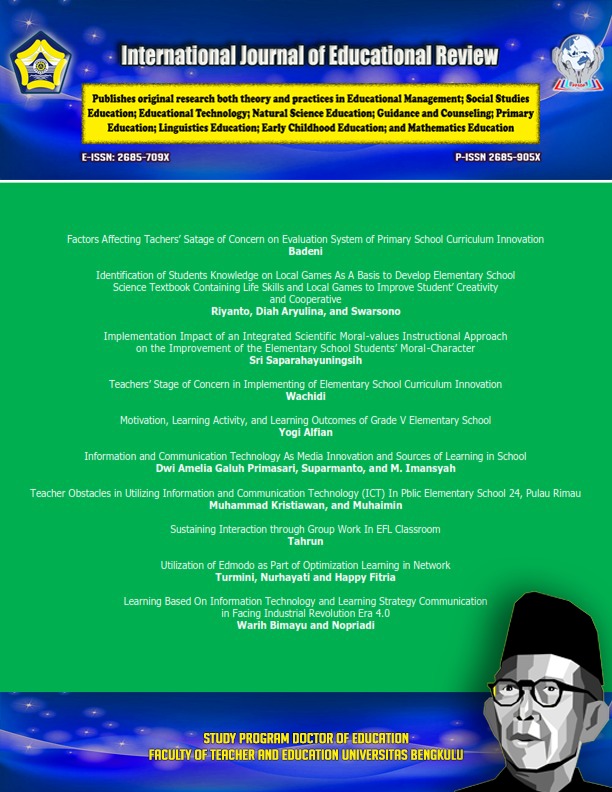Professional Competence Understanding Level of Elementary School in Implementing Curriculum 2013
DOI:
https://doi.org/10.33369/ijer.v2i1.10642Abstract
The specific purpose of this study is to find out professional competence understanding level of elementary school teacher in implementing curriculum 2013 in Bengkulu city. This study used analytical descriptive. This study aimed at describing the professional competence understanding level of elementary school teacher in implementing curriculum 2013. The subject of this study was 100 teachers of elementary schools in Bengkulu City. The object of this study was related to professional competence understanding level of elementary school teacher in implementing Curriculum 2013. The data collecting was conducted by using questionnaire and document. Questionnaire was used to obtain the data about professional competence understanding level of elementary school teacher in implementing Curriculum 2013. To find out and to proof that questionnaire is valid was conducted by expert. Document was used to find out the number of elementary school teacher in Bengkulu City. After the data was collected it was verified, and was processed by using percentage statistic method. The data processing was then analyzed and concluded. In general this study concluded that elementary school teachers in Bengkulu city understands professional competence in implementing curriculum 2013.References
Anonim, (2003). Undang-Undang Sistem Pendidikan Nasional No. 20 Tahun 2003 [National Education System Law No. 20 of 2003]. Jakarta
Beaucham, G. (1981). Curriculum Theory. Wilmette, Illinois: The Kagg Press.
Danim, S. (2003). Visi Baru Manajemen Sekolah [New Vision for School Management]. Jakarta: Bumi Aksara.
Depdiknas. (2005). Program Pengembangan Kurikulum Berbasis Kompetensi [Competency Based Curriculum Development Program]. Jakarta: Direktorat Pendidikan Lanjutan Pertama, Direktorat Jendral Pendidikan Dasar dan Menengah.
Dewi, R. (2015). Pengaruh Kompetensi Profesional Guru terhadap Kreativitas Belajar IPA Siswa SD Se-Gugus Gajah Mada Paranggupito Wonogiri Tahun Ajaran 2014/2015 [Effect of Teacher Professional Competence on Learning Creativity].
Depdiknas. (2006). Hasil Penelitian Balitbang Dikbud [Research and Development Research and Education Center]. Jakarta: Departemen Pendidikan Dasar dan Menengah.
Fitria, H., Kristiawan, M., & Rasyid, A. (2019). The Educational Character on Instruction. Opción, Año 35, Especial No.21 (2019): 964-979
Harian Nasional. (2014). Kurikulum Diterapakan Bertahap [The curriculum is applied in stages]. Jakarta: 14 December 2014.
Hass, G. (1997). Curriculum Planning A New Approach. Boston: University of Florida.
Irsyad, S. M. (2012). Pengaruh Kompetensi Profesional Guru dan Fasilitas Belajar Terhadap Hasil Belajar Siswa [The Effect of Teacher Professional Competence and Learning Facilities on Student Learning Outcomes].
Kompas. (2014). Revisi Kurikulum 2013 Butuh Waktu [Curriculum 2013 Revision Takes Time]. Jakarta: 8 December 2014.
Kristiawan, M., Nizarani., & Syamsidar. (2019). Role of School on Forming Character of Z-Generation Through Entrepreneurial Skills. International Journal of Scientific & Technology Research, 8(10).
Kristiawan, M. (2015). A Model of Educational Character in High School Al-Istiqamah Simpang Empat, West Pasaman, West Sumatera. Research Journal of Education, 1(2), 15-20.
Majid, A. (2005). Perencanaan Pembelajaran: Mengembangkan Standar Kompetensi Guru [Learning Planning: Develop Teacher Competency Standards]. Bandung: PT Remaja Rosda Karya.
Mulyani, S. (1988). Kurikulum dan Pengajaran [Curriculum and Teaching]. Jakarta: Departemen Pendidikan dan Kebudayaan, Direkktorat Jendral Pendidikan Tinggi, Proyek Pengembangan Lembaga Pendidikan Tenaga Kependidikan.
Mulyasa. (2003). Menjadi Guru Profesional [Become a Professional Teacher]. Bandung: Remaja Rosda Karya.
Nasution, S. (1988). Asas-asas Kurikulum [Curriculum Principles]. Bandung: Jemmars.
Spencer, Lyle M., Jr & Signe M. Spencer. (1993). Competence at work: Models for Superior Perfromace. John Wiley & Sons, Inc.
Ratnawati, Y. (2013). Kompetensi Paedagogik Guru Sekolah Dasar Se-Kecamatan Kretek Kabupaten Bantul [Elementary School Teacher Pedagogical Competencies]. Skripsi.
Roestiyah, N. K. (1982). Masalah-masalah Ilmu Keguruan [Teaching Problems]. Jakarta: Bina Aksara.
Stephen, I., & William B. M. (1982). Handbook in Research and Evaluation. Los Angeles California :University of Sourthen California.
Robbin S. P. (2001). Organizational Behavior. Jakarta: PT Indeks.
Sukmadinata, N. S. (1997). Pengembangan Kurikulum: Teori dan Praktik [Curriculum Development: Theory and Practice]. Bandung: Rosda Karya.
Undang-Undang Nomor 14 Tahun 2005 tentang Guru dan Dosen [Law Number 14 of 2005 concerning Teachers and Lecturers].
Taba, H. (1962). Curriculum Development: Theory and Practice. New York: Harcout Brace and World, Inc.
Yudha, A. (2017). Kompetensi Profesional Guru Sekolah Dasar [Primary School Teacher Professional Competencies]. LINTERA Jurnal Ilmih Kependidikan, Vol 12. No. 1.
Downloads
Published
How to Cite
Issue
Section
License

This work is licensed under a Creative Commons Attribution-ShareAlike 4.0 International License.




